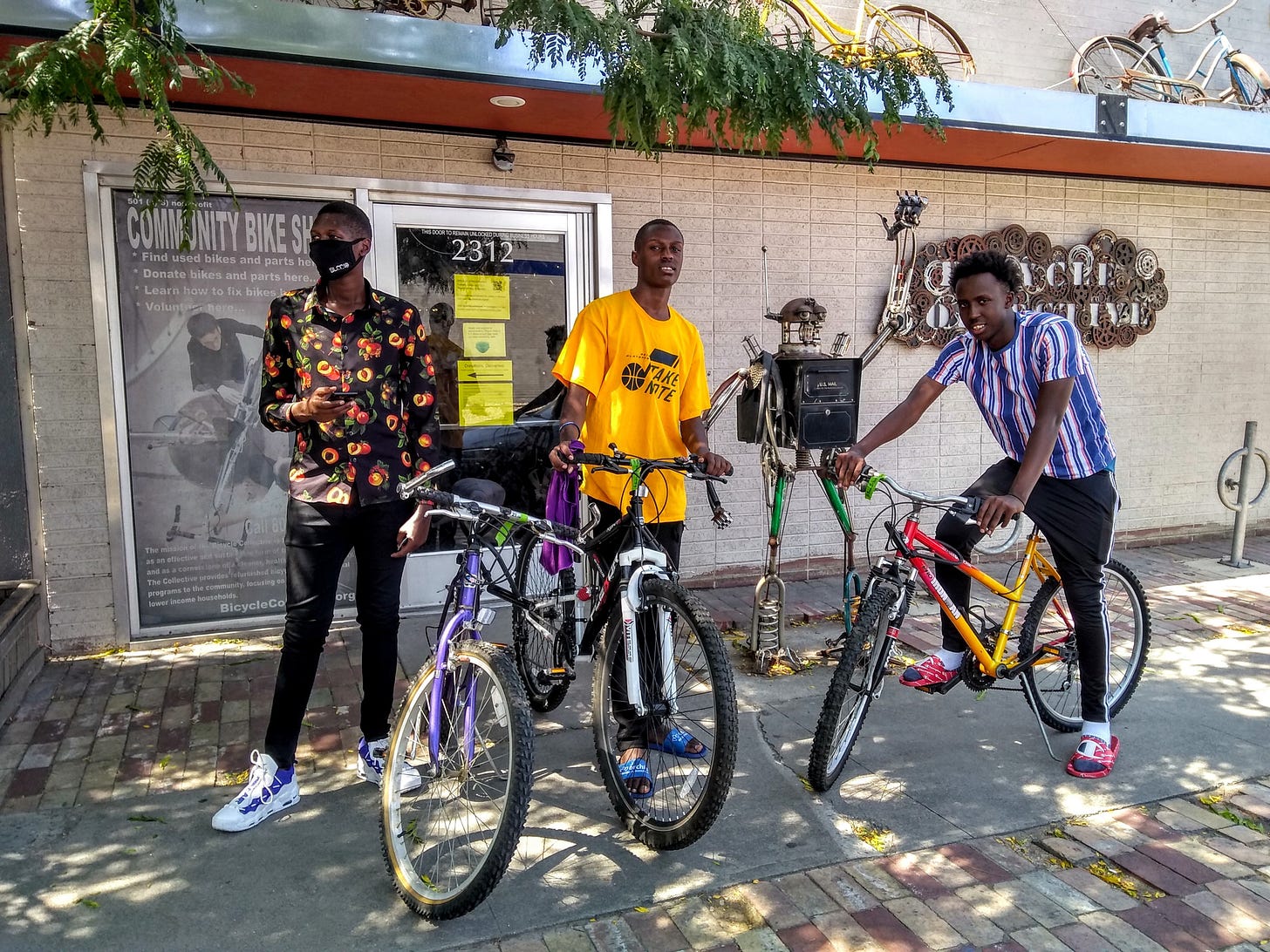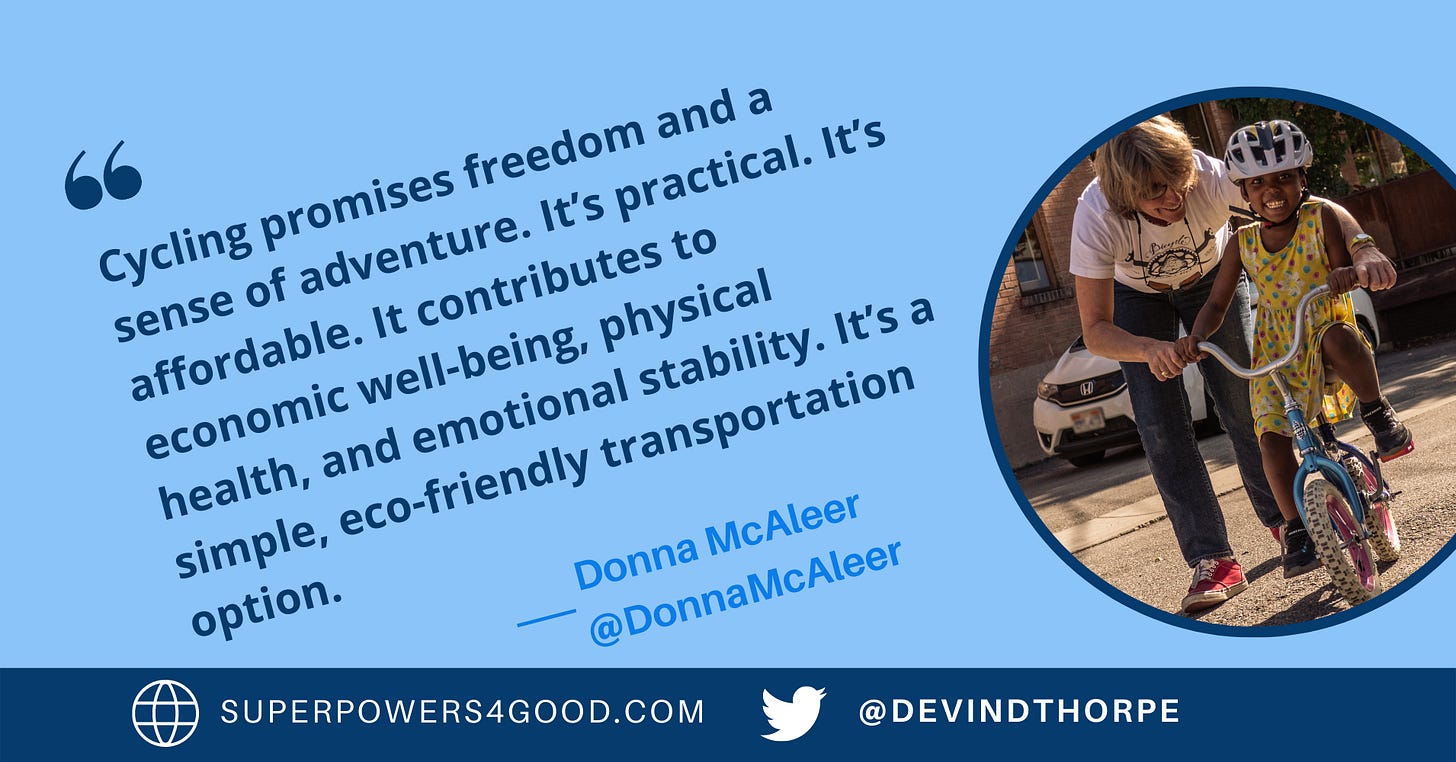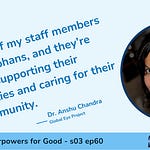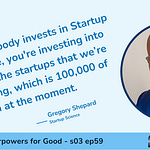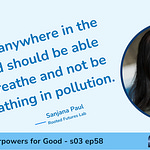Devin: As you look back at your career, what do you see as the superpower that has enabled you to be so successful?
Donna: That superpower is an orientation to service and a desire to make a meaningful and measurable impact in the community. I live and serve that community.
“Transportation is a formidable barrier to economic mobility and just about everything,” says Donna Matturro McAleer, executive director for the nonprofit Bicycle Collective. “Access to everything associated with that upward mobility and progress—whether it’s jobs, whether it’s food, whether it’s goods, health care, schooling—relies upon the ability to get around in an efficient way for an affordable price. And bicycles do that.”
Working to create transportation equity, the Bicycle Collective accepts donated bicycles from people in the community, tunes them up and puts them in the hands of underrepresented communities with unsupported needs. “We repair, refurbish or recycle them with the focus on getting them in the hands of people who don’t have access to independent mobility,” Donna says.
“We focus on newly arrived refugees, people coming out of substance abuse, income-eligible families, individuals experiencing homelessness and housing insecurity,” she adds.
Remembering that “helping any of us helps all of us,” Donna says the bicycle collective provides a significant social return on investment. “Communities with a habit of removing obstacles for different subsets of people tend to get better for everyone.”
Donna shares the story of the Bicycle Collective’s founding:
It got started in 2002, when a group of bicycle enthusiasts in Salt Lake City found a couple of children's bikes in a dumpster and they recovered those bikes, recognizing that there was really nothing wrong with them other than flat tires and needing a little chain grease to get that chain going around the cassette.
They were like, “These are not consumable items, these are durable items. And there is some child out there that could really benefit from a bicycle.” If you think back to your days when you learned to ride a bicycle, the excitement, the adventure, the escape.
That was really how it started.
Donna is passionate about the individual and collective benefits of bicycles. “Cycling promises freedom and a sense of adventure. It’s practical. It’s affordable. It contributes to economic well-being, physical health, and emotional stability. It’s a simple, eco-friendly transportation option.”
Every year, the Bicycle Collective receives about 5,200 donated bikes. “Those are bikes that might have ended up in a landfill,” she says. “Last year alone, we recycled more than 57 tons of material.”
Teams triage the bikes upon arrival. “If we get in a bike and we evaluate it and say, ‘Hmm, probably is a lot of work or too expensive to repair this,” we’ll strip it down for parts, and we’ll make those parts available in our do-it-yourself shops, and then we recycle the rest.”
The Bicycle Collective not only provides bikes to those who can’t afford them, but it also operates thrift stores in Utah where anyone looking for affordable transportation can buy one. “We are growing our digital presence online. Our online shop is open 24/7.”
The pandemic idled one of the organization’s most successful programs. Donna explains:
Pre-pandemic we had a very robust youth program throughout all our four shops and we really ran two programs.
One was what we call an open shop, where we had young people in primarily between the ages of about ten and 16 to learn basic bicycle mechanics. They learned basic bicycle mechanics first by learning the parts of a bike, by learning how to strip it. So while they're in our shop, they're helping us strip bikes that are going to be recycled and put parts in our bins that are available for do it yourselfers.
Over time we ran a—we call it a colored apron system—which was very much like a black belt system in the martial arts that at every increment of knowledge there was an opportunity to demonstrate that skill and work towards a carrot, which was a part or a component. When you reached up to 60 hours of time in the shop, they earned a bicycle that they then could rebuild for themselves.
When COVID hit, obviously, the health and safety of our patrons and our program participants and our staff was paramount.
Donna says the program starts again this summer.
The other youth program she alluded to is a junior bike mechanic certification program. The eight to ten-week program qualifies kids to work as bike mechanics in bicycle shops.
The Bicycle Collective works with 62 community partners to support refugees and other underserved populations. “These are the community partners such as the International Rescue Committee and Catholic Community Services,” Donna says. “Those two are two of the largest organizations that welcome incoming refugees into the state of Utah and help them get started in a new life as new Americans.”
Not only does the Bicycle Collective provide bicycles to people in this community, but it also provides training, so they leave with the ability to keep their bikes running well.
Donna is driven in her work by her superpower, a desire to make a meaningful and measurable impact in the community.
How to Develop a Desire to Make an Impact As a Superpower
Donna is an Army veteran who graduated from the elite military academy West Point. She credits her service with defining her superpower.
When I was 17, I took an oath to protect and defend the Constitution against all enemies, foreign and domestic. And I took that oath again when I graduated and when I was commissioned as an officer in the Army. And we take that oath every time we're promoted. I took that oath again when I was appointed to serve on the Defense Advisory Committee for Women in the Service. I take it very seriously; it's part of my DNA. Just because I no longer wear the uniform doesn't mean that obligation goes away. That obligation is for my lifetime.
Years ago, using her superpower, Donna had the opportunity to coach a high school girls’ volleyball team. “I was surprised at what was being purported and promoted in the media. This is well in advance of the proliferation of social media. But for a lot of the young girls I coached, sexual allure was enshrined as the Rosetta Stone of confidence and self-esteem.”
She wanted to help young women see new measures of success. “I thought if I could expose my young athletes to the women I went to West Point with in the very early years of West Point being open to women and the women I served with in the Army, those I served with, those that were my superiors, those that were in my units, that maybe my young athletes would see and learn of opportunities far beyond their current environment.”
Donna wrote the book Porcelain on Steel, the Women of West Point’s Long Gray Line. It is a collection of biographies about women who graduated from West Point over the first 24 years it was open to women. It begins with a profile of Kathy Gerstein from the class of 1980, the first to include women. It ends with the story of her daughter, Sarah Gerstein, who graduated in 2007.
With the book, Donna hopes to “open the aperture of that definition of success.”
For those wishing to develop their desire to make a measurable impact in the community, Donna suggests three fundamental principles:
Get out of your comfort zone
Learn from failure
Volunteer
By following Donna’s example and advice, you can develop a desire to make a measurable impact in your community as a superpower to help you do more good.
This post includes affiliate links that may provide commissions but that do not increase the price you pay.





